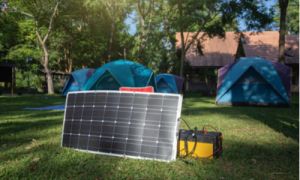Camping’s cool and all, but what if instead of disconnecting from technology and drinking warm beers, we could both charge our phones and keep the beverages frosty to boot? Unless you have the luxury option to splash your cash on a powered camp site, you’ll probably find yourself in woop woop fighting over who gets to use the car charger to juice their iPhone. But the good news is that when the sun isn’t busy making your grey t-shirt dual-toned, it can be used to generate electricity to power small appliances so you can live your glamping dreams. That’s right, we’re talking solar panels. The portable kind. To reiterate, we’re coming to you from this indoor, plugged-into-the-grid office to tell you all you need to know about portable solar panels for camping.
Can you get solar panels for camping?
Yes, you can get solar panels that you can designate to camp use. They’re widely available nowadays, meaning you can get them from pretty much any camping store. There’s a few extra things you’ll need, such us a solar regulator, battery storage and even inverter, depending on what appliance you’ll be powering.
What kind of solar panels do I need for camping?
For the most part, you’ll find monocrystalline solar panels widely available for camping. Although these days they’re the most widely stocked, it’s important to know that they’re not your only option. Let’s break down your options:

- Monocrystalline: These are the most popular option for camping for good reason; they’re highly efficient and able to charge batteries and, depending on their capacity, charge a number of small appliances.
- Polycrystalline: These panels are typically less efficient, however they work better than monocrystalline cells in low light and are generally cheaper than other alternatives. As they charge slowly, they’re less reliable than other panels.
- Thin film: These panels are exactly what they sound like, thin and pliable. Though with convenience comes a lack of efficiency, as these panels will only really work to power gadgets and small tech gear.
Where to buy solar panels for camping
With the wide and wonderful tools of the internet at our disposal, a better question might be: Where can’t you buy portable solar panels? A quick Google search will show you a long list of websites stocking different sorts of solar panels, so you’ll barely need to lift a finger. If, however, you’d prefer to have a geeze at the merchandise before you cart it, here are some chain stores around Australia that may sell solar panels for camping:
- 4WD Supacentre
- Anaconda
- BCF (Boating, Camping, Fishing)
- Beacon Lighting
- Bunnings Warehouse
- Hard Korr
- Tentworld
What watt solar panel do I need for camping?
Without knowing what you plan to power, it’s hard to say what kind of solar panels you’ll need for camping. We’ve covered our bases and made a rough guide as to what you should be looking to buy depending on your electricity needs.
| Trip type | Appliances powered | System size |
|---|---|---|
| Short, infrequent trips | Phones, lights, tablets | 10W, 12V system. Consider using a powerbank to store energy |
| Regular camper | Phones, lights, kettle, fridge, cooking appliances | At least 100W, 12-24V. A small battery of at least 50-75Ah is recommended |
| Nomad | Phones, lights, kettle, fridge, portable aircon, hair dryers and more | 200W+ solar panels, 12-24V. Batteries of 150Ah or more are recommended |
Can a solar panel run a camping fridge?
Certain solar setups will have the capability to run a small camping fridge. Some retailers will even sell camping fridges, batteries and solar panels in one package, setting you up with everything you need from the get-go. If you’re not purchasing a bundle, you should pay close attention to things such as the type of solar panel and its wattage.
Are portable solar panels waterproof?
Most good quality solar panels should be waterproof, but it’s still worth checking with your supplier whether it’s a good idea to keep them outside in the rain or not. It’s probably also worth asking about other elements of your kit, such as your battery, while you’re at it.
How are solar panels set up for camping?
It’s more than just solar panels you’ll need if you want to convert that sun energy into something that can charge your appliances, you’ll need that plus a regulator, battery and inverter or 12 volt outlets.
You’ll connect the panels to the solar regulator, which then feeds into the battery, stopping it from overcharging, using an inverter as the last step to convert the 12V power to an appropriate voltage for your appliances. It should be noted that to skip this step, you’ll have to buy a camping fridge and other elements with 12V by default.
Camping Solar Panel Prices
Portable solar panels can vary in cost greatly by the size and style of system that you choose to purchase. They can generally start at a couple of hundred dollars for a smaller wattage, to a few thousand for good quality, high-end panels. As a general guide, you’ll probably pay between $150 and $500 for panels to cover basic charging and power supply needs.
Are solar panels for camping worth it?
Do you need powered appliances at a campsite? Only you can decide whether purchasing solar panels for your campsite is worth it. Financially speaking, if you’re going to be parking at a campground, there’s probably already facilities allowing you to use power while you’re there. But, if you’re planning an off-grid adventure for an extended period of time, solar panels could be the extra bit of comfort that’ll save you from going mad.
Image credits: Vitalii Nesterchuk/shutterstock.com, Pentium5/shutterstock.com



Share this article